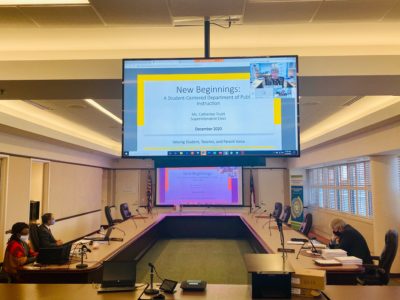Update from Saturday, Dec. 12
We are taking the unprecedented action of writing to you directly to correct the confusion arising from Mark Johnson’s recent misleading messages regarding End-of-Course (EOC) testing. Johnson’s message is incorrect.
To be clear, the State Board of Education’s (SBE) rule requiring EOC’s to count as 20% of a student’s final grade is in effect. The rule has not been delayed. The 20% policy was adopted many years ago, in part, to encourage participation to comply with federal testing requirements. If the SBE can get a waiver from the federal rules that require Public School Units (PSU’s) to administer EOC tests, then the SBE will reconsider its enforcement of the 20% rule. Pending that review, the SBE has expanded the testing window to be sure that PSU’s can safely administer the EOC’s in person this fall, spring and summer. The Board and Superintendent-elect encourage all districts to exercise this expanded window option. With the expanded testing window, districts can delay the EOC fall administration to sometime up to June 2021.
The SBE communicated each of these points to Superintendent Johnson last week when discussing fall EOC testing administration during its December 2020 regularly scheduled meeting. Johnson’s decision to ignore that message and deliberately sow confusion around the administration of EOC tests this fall is a serious disservice to North Carolina students.
We know that despite the heroic efforts of our schools, teachers and parents the COVID-19 pandemic has seriously disrupted the lives of all our students. We share the frustration that parents and students are feeling. However, as we begin to see the end of the pandemic, we cannot ignore what has happened to our children. The EOCs are part of our efforts to document the losses that we believe the pandemic has inflicted on our students. That information will provide the foundation for future remedial actions, including our efforts to secure the additional resources necessary to support the educational losses our children have suffered.
Original statement from Thursday, Dec. 10
COVID-19 continues to present challenges and opportunities for our public schools. Since March 2020, the State Board of Education (SBE) and the Department of Public Instruction have modified policies to provide for the safety of our students and staff and to minimize the impact of the pandemic on our students.
Part of our recovery from COVID-19 is assuring we have appropriate measures in place to determine with certainty the academic and non-academic needs of our students. Testing allows us to determine the appropriate steps to help students meet their educational goals. We continue to explore our options to waive punitive accountability measures for the 2020-21 school year. However, federal testing and accountability measures can be waived only by the U.S. Secretary of Education. At this time, no waivers from the current secretary are forthcoming.
In the meantime, the SBE has authorized districts greater flexibility in establishing a grading scale that will minimize the impact of low assessment scores. Further, the SBE has provided districts the authority to delay assessments until June 2021 to provide increased safety in test administration and give more time for potential waivers to be approved. DPI has recommended that the SBE apply for a waiver for the federal requirement of 95% student participation in testing as well as for state accountability measures, such as school performance grades and low performing status for schools. The SBE will consider this action at its January meeting and anticipates a federal response in late spring.
Additionally, misinformation has circulated about the SBE’s authority to alter a state policy requiring assessments to comprise 20% of a student’s grade. While the SBE has authority to change that threshold, we are aware that lowering the 20% will likely lower student participation, which would be a violation of federal law. Therefore, it is imperative that the U.S. Secretary of Education waive the federal requirement for 95% testing participation before we consider this policy change. In the meantime, the flexibility afforded districts to delay assessments until June 30 provides students the option to postpone testing while the new secretary of education responds to our waiver request.
Lastly, we have explored conducting assessments remotely. Unfortunately, recent assessments given remotely earlier this year revealed unusually high spikes in some students’ performance, which call into question the reliability of remote assessments — an issue occurring in many states. We are required by law to ensure assessment reliability and therefore have concluded that remote assessments are not possible at this time.
“Conducting testing is an essential part of a student’s educational journey,” Superintendent-Elect Catherine Truitt said. “As an educator and parent of two public school students, I believe the more knowledge we have of our children’s progress the better.”
Maureen Stover, 2020 Burroughs Wellcome Teacher of the Year, believes that “testing our students allows educators to receive valuable data about what students understand and need in order to master concepts. The data provided helps to identify knowledge gaps while also providing students the opportunity to demonstrate what they have learned in school.”
Dr. Anthony Jackson, Vance County Superintendent and 2020 Superintendent of the Year, said, “We know there is learning loss across our state. Many students may have limited or no access to consistent learning. Without testing students, we will not have an appropriate measure to construct personal learning plans for students. We must eliminate the punitive measures for this year, but we must not forgo testing as doing so creates substantial equity issues deterring our recovery from COVID-19.”
With so many uncertainties during the pandemic, it is important that educators not lose track of student learning. We conclude by concurring with Mr. Matthew Bristow-Smith, 2019 Wells Fargo Principal of the Year — “State assessments provide us data on each and every scholar’s learning, allowing educators to respond to learning loss, close achievement gaps, and grow all scholars. While the physical safety of our scholars is always our top priority, this assessment data is needed to drive our instruction moving forward. And that is the commitment we have made to our NC public school children — to move all kids forward.”



